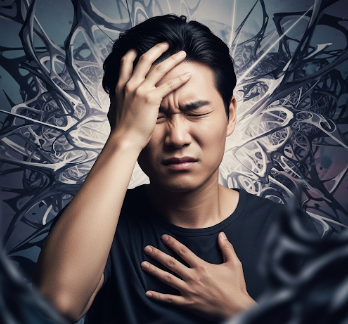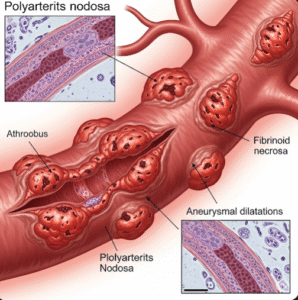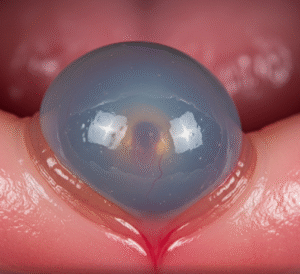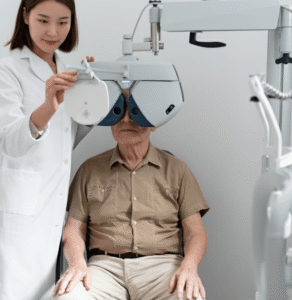Overview
Psychogenic pain refers to physical pain that arises primarily from psychological, emotional, or mental factors rather than direct tissue injury or a clear medical condition. While the pain is very real to the person experiencing it, it does not have a straightforward physical explanation. Instead, it is influenced by conditions such as stress, anxiety, depression, or trauma.
In Korea, psychogenic pain is taken seriously in the field of pain medicine and psychiatry. Many top hospitals and clinics specialize in diagnosing and treating this condition using multidisciplinary care, combining psychology, neurology, psychiatry, and pain management therapies.
➤ The pain is real, even though no clear physical damage can be found.
➤ Commonly linked to stress, anxiety, depression, or past trauma.
➤ Requires a holistic treatment approach, including both mind and body therapies.
Key Facts
➤ Psychogenic pain is not imaginary—the brain processes it as real pain.
➤ Can affect any part of the body (headaches, back pain, stomach pain, joint pain, etc.).
➤ Often worsens under stress, fatigue, or emotional strain.
➤ More common in people with mental health conditions like depression or anxiety.
➤ In Korea, advanced integrated pain clinics offer treatments combining psychiatry, physical therapy, and cognitive behavioral therapy (CBT).
What is Psychogenic Pain?
Psychogenic pain is a type of pain where the main contributing factor is psychological rather than physical. Unlike acute pain caused by an injury or disease, psychogenic pain:
➤ May not show up on scans, X-rays, or lab results.
➤ Can persist for months or even years (chronic pain).
➤ Feels just as intense as physically-caused pain.
➤ Often occurs in the absence of a medical explanation.
It does not mean the pain is “all in someone’s head.” Instead, the brain interprets emotional stress or mental health issues as physical pain signals.
What Symptoms Are Related To
Psychogenic pain can vary in intensity, frequency, and location. Common symptoms include:
➤ Headaches or migraines without clear neurological cause.
➤ Chronic back pain or neck pain despite normal imaging results.
➤ Abdominal pain, nausea, or digestive discomfort linked to stress.
➤ Joint or muscle pain without inflammation or injury.
➤ Pain that worsens under emotional distress but improves with relaxation.
➤ Sleep problems, fatigue, and mood disturbances accompanying the pain.
What Causes / Possible Causes
Psychogenic pain arises from a complex interaction between the mind and body. Key contributing factors include:
➤ Psychological Stress
➤ Long-term stress increases muscle tension and pain sensitivity.
➤ Anxiety & Depression
➤ Emotional disorders can alter pain pathways in the brain.
➤ Past Trauma or Abuse
➤ Pain may manifest as a physical expression of unresolved trauma.
➤ Somatization
➤ The body expresses emotional distress through physical symptoms.
➤ Brain Chemistry Changes
➤ Neurotransmitters like serotonin and dopamine influence both mood and pain.
When Should I See My Doctor
Since psychogenic pain is difficult to diagnose, it’s important to consult a healthcare provider if you experience:
➤ Persistent pain without a clear medical explanation.
➤ Pain accompanied by anxiety, depression, or emotional distress.
➤ Pain that worsens with stress or improves with relaxation.
➤ Multiple unexplained symptoms across different body parts.
➤ Difficulty performing daily activities due to pain.
A doctor can rule out physical causes first, then refer to pain specialists, psychiatrists, or psychologists if psychogenic pain is suspected.
Care and Treatment
Psychogenic pain requires a multifaceted approach that addresses both physical and psychological aspects.
➤ Lifestyle and Self-Care
➤ Stress reduction techniques (yoga, meditation, breathing exercises).
➤ Adequate sleep and balanced nutrition.
➤ Gentle physical activity (walking, stretching).
➤ Psychological Therapies
➤ Cognitive Behavioral Therapy (CBT): Helps change negative thought patterns about pain.
➤ Psychodynamic Therapy: Explores unresolved trauma contributing to symptoms.
➤ Mindfulness-Based Stress Reduction (MBSR): Teaches acceptance and relaxation.
➤ Medical & Pharmacological Support
➤ Antidepressants or anti-anxiety medications may help regulate brain chemistry.
➤ Pain relief medications are sometimes used but must be managed carefully.
➤ Social & Emotional Support
➤ Counseling, support groups, or family therapy to reduce isolation.
Treatment Options in Korea
Korea offers some of the most advanced integrative pain management systems in Asia, combining modern medicine with psychological therapies.
➤ Multidisciplinary Pain Clinics
➤ Teams of neurologists, psychiatrists, psychologists, and pain specialists.
➤ Holistic assessments including physical exams and mental health evaluations.
➤ Psychiatric and Psychological Services
➤ Leading Korean hospitals provide CBT, counseling, and psychotherapy for pain patients.
➤ Integrative Medicine
➤ Use of acupuncture, meditation, herbal support, and traditional Korean medicine alongside Western treatments.
➤ Advanced Hospital Care
➤ State-of-the-art facilities like Seoul National University Hospital, Asan Medical Center, and Samsung Medical Center offer specialized psychogenic pain programs.













